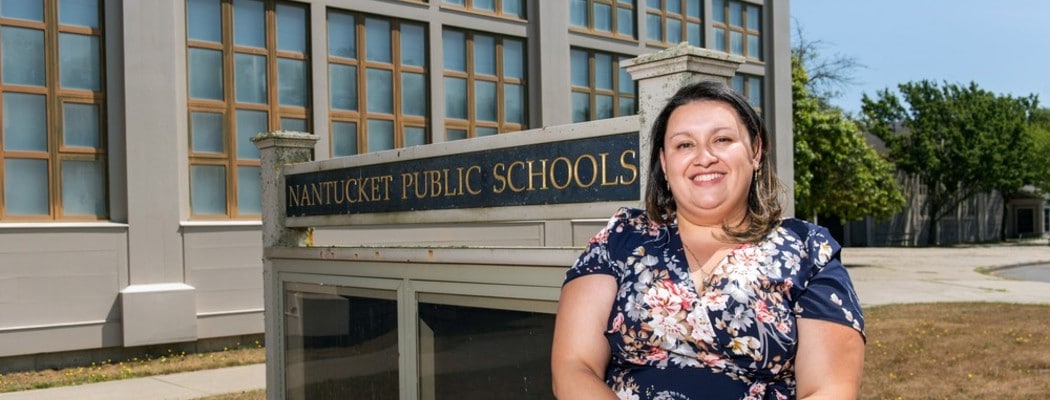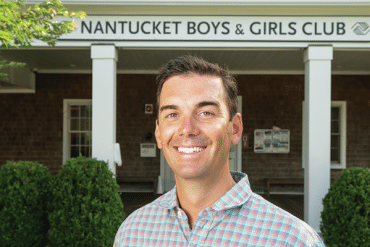How Esmeralda Martinez became the voice of a community on Nantucket.
Despite representing a growing percentage of the island’s year-round population, the Latinx community has never had an official voice in Nantucket’s town government. That was until this spring. Esmeralda Martinez is known on Nantucket for helping the Latinx community navigate cultural and language barriers. Even so, when she decided last year to make a bid to become the first-ever Latinx person elected to a town board, she was admittedly nervous. “I did not know what to expect,” she says, “but now that I am on the school committee, I feel honored that the community really made this happen for me.” Not only did Martinez get elected this past June, but she received a record number of votes, more than any other person in the long history of the Nantucket Public Schools’ board.
Though Martinez was born and raised in Boston, she knows what it’s like for a family to adopt a new country in a quest for a better life. In the 1980s, her parents fled the brutal Salvadoran civil war. She grew up in Allston/ Brighton and Revere, where, in high school, she met a boy from Nantucket whose parents owned the flower shop where she worked after school. They began dating, and after a falling out with her own parents, sixteen-year-old Martinez moved to Nantucket during a particularly snowy, bone-chilling March to live with her boyfriend’s family.
By the time Martinez was a senior at Nantucket High School, she was married and had a baby girl. She graduated on a Saturday in 2005 and started work at the Steamship Authority the following Monday. She would have liked to continue her education, but she had a child to support and for young women in her situation, she’d been told that college simply wasn’t an option. Instead, she became the only Spanish-speaking ticket seller at the Nantucket terminal.
Shortly after starting her job at the Steamship Authority, a girl of around twelve years old came to her counter asking to book a car reservation for her parents. The girl reminded Martinez of herself at that age, having to translate for her parents at parent-teacher conferences, the bank and the registry of motor vehicles. “I remember her mom and dad came in, and she translated for them,” Martinez recalls. “When they noticed I was there, I could see the little girl’s face. She was so relieved that there was someone that actually spoke Spanish and she didn’t have to translate for her parents anymore.”
Soon after Martinez started helping the Deras family more— their little girl, Emile, is now twenty-eight—and more Spanish-speaking island residents started seeking her out. Word spread that if you needed someone to help read your letters or fill out paperwork, Esmeralda at the Steamship was “your girl.” Everyone knew where to find her. “I called them my groupies,” she laughs. “It just made it easier for them. The Steamship was a very intimidating place at the time.” In the process, she also learned about their struggles, coming from different countries to a predominantly white community. She assisted however she could, helping residents navigate the RMV and apply for their driver’s license, and even becoming a justice of the peace to perform weddings in their native tongue.
“For the most part, everybody’s very welcoming here,” Martinez says. “I don’t feel they run into any racism issues. It’s mostly more of a culture shock. And, obviously, the language.”
Now taking college courses online and working as an administrative specialist for the town’s Planning & Land Use Services office, Martinez is determined to give all students what she didn’t receive: a greater opportunity to pursue college. During the school committee campaign, she talked about being a voice for the Latinx community and about building trust and collaboration. She plans to advocate for families and students, strengthen anti-bullying programs and rebuild connections and learning experiences affected by COVID-19. She’s happy to see more outreach happening in Nantucket’s multicultural community, not just for Salvadorans, Mexicans and other Spanish speakers, but also for Portuguese and Jamaican-born residents. It’s a priority for her to bolster these efforts through her role on the school committee. “The Latinx community is very supportive,” she says. “They’re very excited, very happy that there’ll be someone on the board to voice their concerns.”








